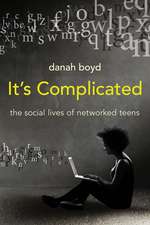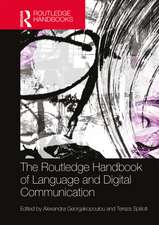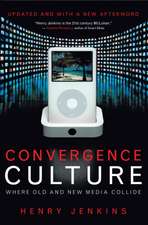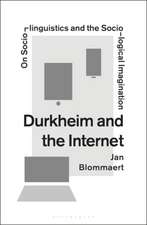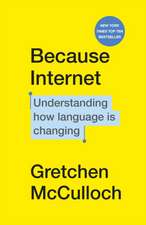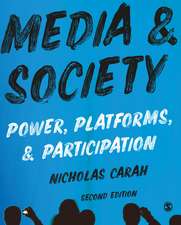Social Media: A Critical Introduction
Autor Christian Fuchsen Limba Engleză Paperback – 24 mar 2021
Social media are an integral part of contemporary society. From news and politics to language and everyday life, they have changed the way we communicate, use information and understand the world. So we have to ask critical questions about social media. We have to dig deeper into issues of ownership, power, class and (in)justice.
This book equips you with a critical understanding of the complexities and contradictions at the heart of social media’s relationship with society. The revised and expanded
| Toate formatele și edițiile | Preț | Express |
|---|---|---|
| Paperback (2) | 294.40 lei 3-5 săpt. | +36.34 lei 5-11 zile |
| SAGE Publications – 26 dec 2024 | 294.40 lei 3-5 săpt. | +36.34 lei 5-11 zile |
| SAGE Publications – 24 mar 2021 | 319.90 lei 3-5 săpt. | +36.35 lei 5-11 zile |
| Hardback (2) | 588.11 lei 6-8 săpt. | |
| SAGE Publications – 20 ian 2025 | 588.11 lei 6-8 săpt. | |
| SAGE Publications – 24 mar 2021 | 904.54 lei 6-8 săpt. |
Preț: 319.90 lei
Nou
61.22€ • 63.68$ • 50.54£
Carte disponibilă
Livrare economică 24 martie-07 aprilie
Livrare express 08-14 martie pentru 46.34 lei
Specificații
ISBN-10: 1529752744
Pagini: 448
Dimensiuni: 170 x 242 x 29 mm
Greutate: 0.71 kg
Ediția:Third Edition
Editura: SAGE Publications
Colecția Sage Publications Ltd
Locul publicării:London, United Kingdom
Recenzii
Cuprins
1. What Is a Critical Introduction to Social Media?
2. What Are Social Media?
3. Big Data Capitalism
APPLICATIONS
4. The Power and Political Economy of Social Media
5. Google: Good or Evil Search Engine?
6. Facebook and WhatsApp: Surveillance in the Age of Fake News
7. Influencer Capitalism: Reified Consciousness in the Age of Instagram, YouTube, and Snapchat
8. Twitter and Democracy: A New Public Sphere?
9. Right-Wing Authoritarianism on Social Media
10. Weibo: Power, Ideology, and Social Struggles in China
11. The Sharing Economy of Airbnb, Uber, and Upwork
12. Platform Capitalism
13. Wikipedia: A New Democratic Form of Collaborative Work and Production?
FUTURES
14. Capitalist Social Media’s Major Problems and Alternatives
15. A Manifesto for Truly Social Media
Notă biografică
Christian Fuchs is Professor at the University of Westminster, where he is the Director of the Westminster Institute for Advanced Studies and the Director of the Communication and Media Research Institute. His research fields are critical theory, critical media/communication studies, critical digital studies.
Fuchs is a critical theorist of communication and digital media. He is the author of many works about the roles of media, communcation, and the Internet in society.
His books include "Marxist Humanism & Communication Theory" (2021), "Communication and Captalism: A Critical Theory" (2020), "Marxism: Karl Marx¿s Fifteen Key Concepts for Cultural & Communication Studies"
(2020), "Nationalism on the Internet" (2020), "Rereading Marx in the Age of Digital Capitalism" (2019), "Digital Demagogue: Authoritarian Capitalism in the Age of Trump and Twitter" (2018), "Critical Theory of Communication" (2016), "Reading Marx in the Information Age" (2016), "Culture and Economy in the Age of Social Media" (2015), "OccupyMedia!"
(2014), "Digital Labour and Karl Marx" (2014), "Foundations of Critical Media and Information Studies" (2011), "Internet and Society" (2008).
@fuchschristian,
http://fuchsc.net


